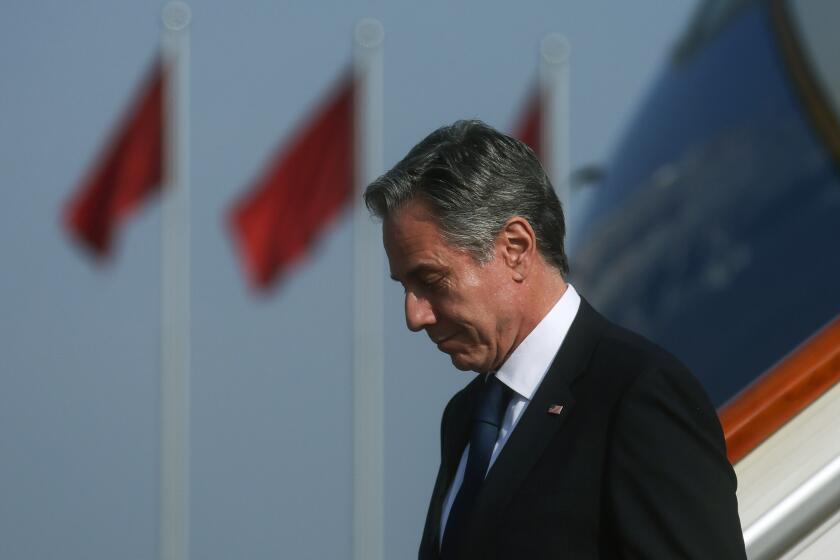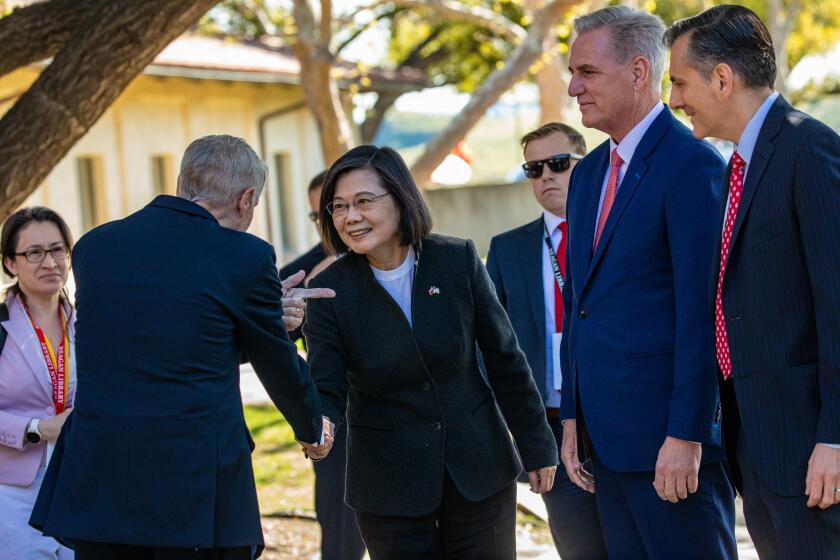Blinken and Xi report progress on U.S.-China relations, but military communication remains elusive

- Share via
WASHINGTON — Wrapping up a two-day high-stakes mission to China, America’s top diplomat held “candid, constructive” talks with President Xi Jinping and other officials that eased tensions but left major, daunting differences unresolved, both sides said Monday.
Secretary of State Antony J. Blinken said “we have made progress” but there remain “many issues on which we profoundly, even vehemently disagree,” such as China’s military expansion, threats to the self-ruled island of Taiwan and human rights.
Blinken said he believed he accomplished one major task by attempting to reassure China that the Biden administration is not seeking to undermine it and by reopening channels of communication that had all but slammed shut amid badly deteriorating U.S.-China ties.
“Look, it was clear coming in that the relationship was at a point of instability, and both sides recognized the need to work to stabilize it,” Blinken told reporters at the American Center in Beijing. He said the two governments agreed to send senior officials to each other’s country in the coming weeks.
The 35-minute meeting with Xi at the Great Hall of the People was not a guaranteed event and was confirmed to journalists only about an hour before it took place.
Blinken failed to revive military-to-military communications, the process by which the two superpowers’ armed forces regularly confer in part to avoid accidental clashes or other crises. Blinken said he raised the issue “repeatedly” to no avail.
In recent weeks, there have been several near-collisions involving Chinese and U.S. sea vessels and aircraft in the Taiwan Strait. And in at least one case, China’s defense ministry refused to take a call from U.S. Secretary of Defense Lloyd J. Austin III.
After worsening ties between China and the U.S., Blinken aims to find common ground in Beijing, the first U.S. secretary of state to visit in five years.
“The meetings that we had were very candid, very in-depth, and in places constructive,” Blinken said. “And in other places we have a lot more work to do.”
Blinken added that “progress is hard,” noting “it takes time; it takes more than one visit, one trip, one conversation.”
Xi seemed pleased with the meeting, saying he concurred that the world needs a stable U.S.-China relationship, with neither country attempting to challenge or replace the other, according to the official Xinhua news service.
The Chinese president said the meeting was “positive” and the two sides “made progress and reached some agreements,” China Central Television reported, without elaboration.
Others were less sanguine.
A new Taiwanese Netflix drama envisions a world of politics with women at the forefront — and tensions with mainland China conspicuously absent.
Hu Xijin, former editor-in-chief of the Communist Party-backed Global Times, said that the visit seemed to go well. But, he said on Chinese social media platform Weibo, future developments would depend on whether the U.S. continued to “play the trick of saying one thing before the meeting, and then doing another after.”
On Taiwan, differences remained sharp. Blinken said he assured the Chinese that U.S. policy on the island, which Beijing views as its own, has not changed and the Biden administration does not support its independence. At the same time, he said he told them that the U.S. opposes unilateral steps by either Beijing or Taipei to change the island’s status. And he complained about China’s “provocative” actions around Taiwan.
Wang Yi, the Chinese former foreign minister with whom Blinken also met, said later that Taiwan remains a central theme in the U.S.-Chinese relationship.
“On this issue, China has no room for compromise or concession,” Wang said, according to Xinhua.
The conflict between the U.S. and China over Taiwan’s sovereignty is political theater with drastic consequences.
Blinken’s trip, the first to China by a U.S. secretary of State in five years, was delayed by four months after the angry dispute over what the U.S. said was a Chinese spy balloon that traversed the North American continent before being shot down by an American fighter jet. The talks were meant to follow up on initial contacts made last year by Xi and President Biden at a summit in Bali.
In his public comments, Blinken did not detail human rights conditions in China and Hong Kong, where dissent is being brutally silenced and hundreds of thousands of ethnic Uyghurs are confined to labor camps. On Ukraine, Blinken said he reiterated a warning to Beijing that it not send lethal aid to Russia and to “be very vigilant” that any aid it does send not be converted to military purposes.
And there was no indication of substantive progress on other vexing issues including trade — China complains bitterly of tariffs imposed during the Trump administration — opiate production and the export of chemicals used to make fentanyl, the drug that has made the U.S. addiction crisis even more deadly.
Ahead of the trip, U.S. officials downplayed expectations for Blinken’s diplomatic efforts, given how low the relationship had sunk. Renewing communication and agreeing to “manage” their differences were the critical first steps, Blinken said.
“The United States is committed to doing that,” he said. “It’s in the interest of the United States, in the interests of China and in the interest of the world.”
Wilkinson reported from Washington and Yang from Taipei. Special correspondent David Shen contributed from Taipei.
More to Read
Sign up for Essential California
The most important California stories and recommendations in your inbox every morning.
You may occasionally receive promotional content from the Los Angeles Times.


















